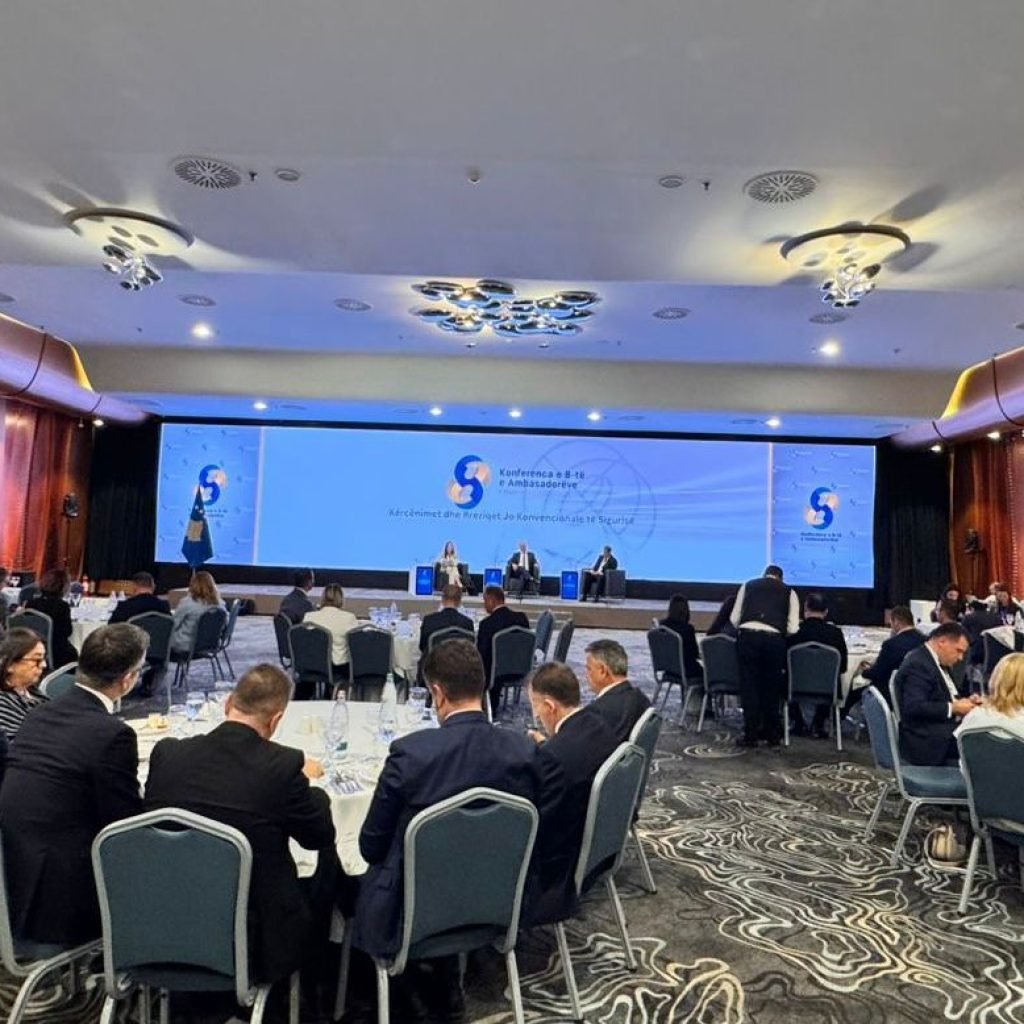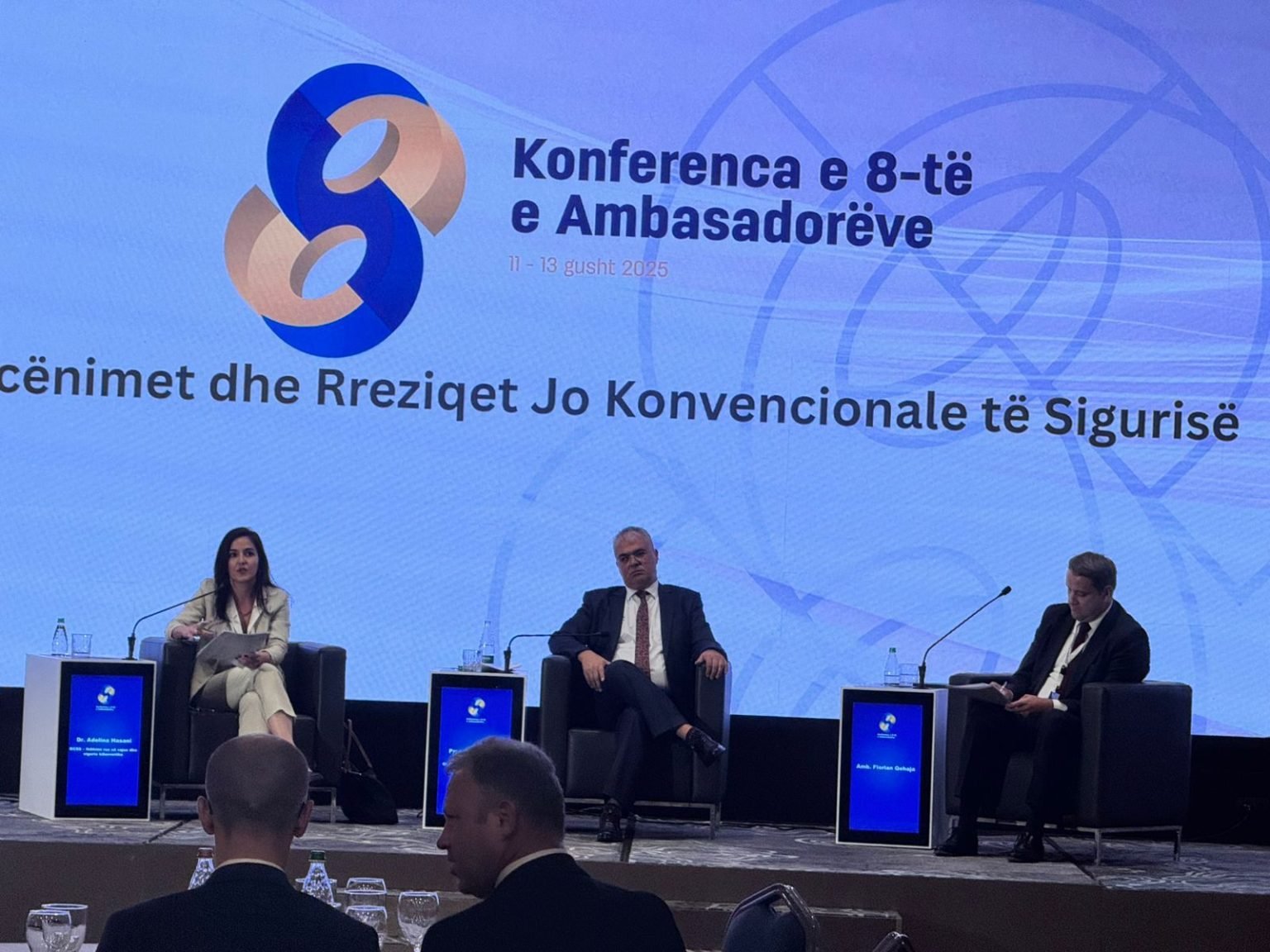The address of the Director of the Institute for Hybrid Warfare Studies “OCTOPUS,” Assoc. Prof. Dr. Arben Fetoshi, participated in the 8th Ambassadors’ Conference, organized by the Ministry of Foreign Affairs and Diaspora of Kosovo. The conference, held in Pristina, featured several thematic sessions, including one titled “Non-Conventional Security Threats and Risks,” in which Mr. Fetoshi took part.
—
PROPAGANDA AS “HIGH RISK”
In the current circumstances of geopolitical clashes, the Republic of Kosovo is a frontline between the democratic order and its enemies; it is the battlefield between the TRUTH and its distortion, as a precondition for the goals of Serbia’s and Russia’s expansionist policies.
The declaration of independence (17 February 2008) and the decision of the International Court of Justice that legitimizes it (22 July 2010), have revealed the narrative paradox – with their rejection and misuse – depending on the calculations of the Serbia–Russia hybrid war.
Vladimir Putin has misused Kosovo as a “precedent” in the aggression against Georgia (2008) and later Ukraine (2014 and 2022), undertaking an offensive of lies (Firehose of Falsehood model), to influence the international perception of the “culprit,” whereas Serbia has rejected the decision it had itself requested from the UN General Assembly, escalating hybrid actions against Kosovo through propaganda, armed attacks, and sabotage, via its espionage network and proxy groups.
Thus, a tendentious misinterpretation for narrative manipulation, camouflages the revisionist and chauvinistic ambitions of the “Russian World” and the “Serbian World,” turning Kosovo into a test for the functioning of the international order. Regarding the ICJ opinion, Professor Mark Weller (2009) states that “ignoring such decisions by a state that aspires to integrate into the European Union, undermines not only the international legal order but also the credibility of the EU itself.”
According to NATO (2016), hybrid warfare is “a broad, complex, and adaptive combination of conventional and unconventional means, as well as overt and covert military, paramilitary, and civilian measures, integratedly used by states and non-state actors to achieve strategic objectives.”
Meanwhile, the American scholar who conceptualized the term “hybrid warfare,” Frank Hoffman (2009), argues that modern conflicts are no longer merely “conventional” or “unconventional,” and in this context, propaganda is a strategic weapon that precedes aggressive actions, as evidenced by the attack in Banjska, Zveçan (2023).
The ideological basis of Serbian propaganda – a mixture of mythology, historical falsification, and ethno-religious nationalism – is linked to Ilija Garashanin’s “Načertanije” plan (1844) for territorial expansion through control of non-Serb areas, and the Memorandum of the Serbian Academy of Sciences (1986) for the strategy of victimization, as a prelude to the dark era of Milosheviç with violence and crimes of genocide during the dissolution of the former Yugoslavia.
Even today, Serbia continues the same strategy, now more sophisticated due to the opportunities offered by the digital revolution. Synchronization with the Russian strategy, by applying well-known techniques such as “emotional hijacking,” which aims to mobilize by arousing indignation among citizens, or “gaslighting,” which seeks to deceive at the international level through distortion of reality, serves as an instrument of “justification,” just as in the time of Milošević or Putin’s military interventions in Georgia (2008) and Ukraine (2014).
After the war ended (1999), it orchestrated coordinated smear campaigns through the strategy of victimization, for alleged “KLA crimes” and “NATO aggression,” resulting in the imposition of the Specialist Chambers in The Hague, where leaders of the liberation war continue to be tried.
Its propaganda strategy combines historical and political narratives as a coordinated instrument for hegemonistic goals: the myth of Kosovo as the “cradle of Serbia” or “Serbian holy land,” “Serbs as victims” of Albanian Islamic extremism, of NATO, and today, of “persecution or ethnic cleansing” by the state of Kosovo, as well as claims of supposedly “protecting” the international order, presenting Kosovo as an unresolved issue, the “endangerment” of Serbian heritage, “harassment of Serbian girls by the police,” etc., have the aim to:
- Undermine the Republic of Kosovo by obstructing its international subjectivity (recognitions and membership in international organizations);
- Influence international public and political perception, calculating benefits to the detriment of Kosovo’s integrity and constitutional order;
- Legitimize Serbia’s interventions through parallel structures and proxy organizations such as the Serbian List, calculating territorial claims;
- Deepen mistrust toward institutions, ethnic divisions, and insecurity, hindering the integration of Serbian citizens;
- Strengthen anti-Western sentiments through the demonization of NATO, calculating strategic interests with Russia and China.
Therefore, to answer the guiding question in this topic and based on Kosovo’s experience and the security frameworks of hybrid warfare (Hoffman, Shultz & Godson), the risk level of Serbian propaganda for Kosovo can be characterized as high. Because:
- It is part of a long-term state strategy, coordinated by Serbia’s political, diplomatic, media, and religious institutions;
- It is synchronized with Russia, which increases the threat level as part of a network with global capacities;
- It has produced concrete political and legal consequences, such as the Specialist Court, the obstruction of new recognitions, and the blocking of Kosovo’s membership in international organizations – UN, UNESCO, etc.;
- It has damaged internal cohesion by deepening mistrust and ethnic divisions;
- It has served as preparation and justification for other hybrid operations – the Banjska incursion, the attack on the Ibër-Lepenc canal, etc.
To neutralize this high risk, concrete actions are necessary to:
- Establish a National Center against Disinformation;
- Increase diplomatic capacities for identifying and countering manipulative narratives in international opinion;
- Maintain and strengthen partnership with allies and international institutions;
- Encourage civil society and independent experts on the front of the information war, as in the Baltic model with the “elves” network that detects, exposes, and neutralizes Russian propaganda in the digital space.
Distinguished ambassadors,
In an environment where unconventional threats often precede conventional war, diplomacy is the first line of strategic defense.
The defense of Kosovo is the defense of the international order, as much as the defense of Ukraine or Georgia.
Thank you!


